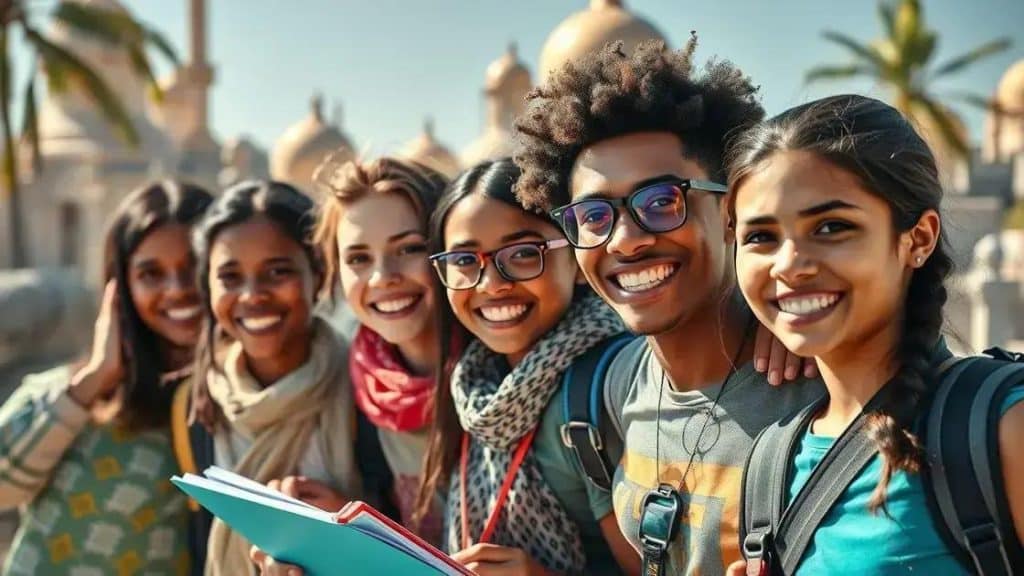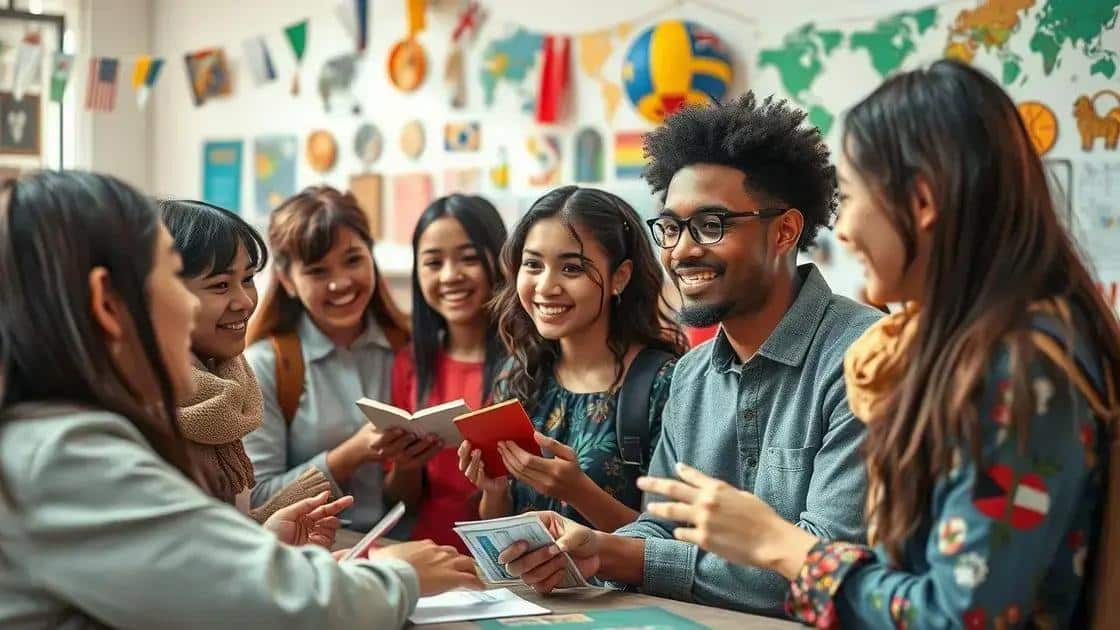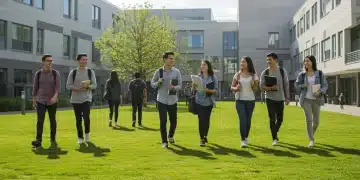Travel education equity news: bridging gaps in access

Travel education equity ensures all students have equal access to enriching travel experiences, fostering cultural awareness and critical skills essential for their personal and academic growth.
Travel education equity news is crucial in ensuring everyone has access to learning through travel. Have you ever thought about how traveling can shape educational experiences? In this article, we’ll dive into the importance of travel education and the initiatives that are making a difference.
Understanding travel education equity
Understanding travel education equity is essential for ensuring that everyone has the opportunity to learn and grow through travel experiences. Many students miss out on these enriching opportunities due to various barriers. By examining what travel education equity means, we can identify ways to create more inclusive experiences.
What is Travel Education Equity?
Travel education equity refers to the fair access to educational experiences that come through travel. It emphasizes the importance of providing similar opportunities for all students, regardless of their background or financial situation. Equity can greatly enhance learning, fostering a more inclusive understanding of the world.
Barriers to Access
Many students face challenges when it comes to accessing travel education opportunities. These can include:
- Lack of funding for school trips.
- Limited information about available travel programs.
- Socioeconomic factors that restrict travel opportunities.
- Cultural differences that may discourage participation.
Addressing these issues is vital for broadening access to educational travel. When we make it easier for all students to travel for education, we open doors to new experiences and knowledge.
Additionally, when schools implement programs aimed at promoting travel education equity, they help level the playing field. Programs can include subsidizing costs, offering scholarships, or partnering with organizations that provide travel opportunities.
The Role of Schools and Organizations
Schools and local organizations play a crucial role in fostering travel education equity. By collaborating to create programs that support students in need, they can help bridge the gap. Educators can also work to raise awareness about these initiatives within their communities.
Overall, by understanding travel education equity, we can begin to dismantle systemic barriers that prevent students from experiencing the benefits of travel. With concerted efforts from educators, organizations, and communities, equitable access to travel can become a reality.
Current trends in travel education

Current trends in travel education reveal exciting changes that enhance learning experiences across the globe. Today, more schools are recognizing the value of travel as a powerful educational tool. As society evolves, so does the approach to learning through travel.
Experiential Learning
One major trend is the rise of experiential learning, where students gain knowledge through direct experiences. Traveling offers hands-on opportunities to learn about different cultures, languages, and histories. This method provides a deeper understanding than traditional classrooms can offer.
Integration of Technology
Technology is playing a vital role in shaping travel education. Virtual reality (VR) and augmented reality (AR) allow students to explore the world without leaving their classrooms. These tools enhance learning by providing immersive experiences that stimulate curiosity and engagement.
- Schools are utilizing virtual exchanges with classrooms worldwide.
- Online platforms offer travel-related courses.
- Mobile apps assist in planning educational trips.
Moreover, using technology helps reduce costs and makes travel more accessible. Through these channels, educators can connect students with global cultures and ideas.
Furthermore, sustainability has become a key focus in travel education. Many educational programs are emphasizing responsible travel and environmental stewardship. This shift not only teaches students to appreciate nature but also encourages them to become advocates for the planet. Schools aim to inspire future leaders who prioritize eco-friendly practices in their travels.
Diverse Travel Opportunities
Another trend is the diversification of travel programs. More organizations are offering trips tailored to different student needs, including those from diverse backgrounds. These programs aim to create inclusive experiences that reflect various perspectives. This approach helps students feel represented and valued during their educational journeys.
By analyzing these trends in travel education, it is clear that a transformative shift is underway. Students are benefiting from innovative methods and a broader understanding of the world.
Impact of travel on educational opportunities
The impact of travel on educational opportunities is significant and multifaceted. Traveling allows students to engage with different cultures, languages, and environments, enriching their learning experiences. These opportunities not only broaden their understanding of the world but also help develop crucial life skills.
Real-World Learning Experiences
One of the most important benefits of travel is the chance for real-world learning. When students explore new places, they gain firsthand knowledge that classroom lessons can’t match. For example, visiting historical sites can provide deeper insights than reading about them in a textbook.
Development of Critical Skills
Travel also fosters the development of essential skills that benefit students throughout their lives. These skills include:
- Cultural awareness: Understanding and appreciating different cultures promotes empathy and tolerance.
- Adaptability: Traveling teaches students to adjust to new environments and situations.
- Communication: Engaging with diverse groups improves verbal and non-verbal communication skills.
- Problem-solving: Navigating unfamiliar places encourages innovative thinking and quick decision-making.
Through these experiences, students become more well-rounded individuals who are prepared for global citizenship.
Moreover, travel often inspires students to pursue their interests in subjects like geography, history, and language. Exciting field trips and study abroad programs can ignite a passion for learning that lasts a lifetime. When students visit foreign countries, they often return with a renewed enthusiasm for education.
Enhanced Career Prospects
The impact of travel on educational opportunities extends to future career prospects as well. Employers greatly value candidates who have international experience. Travel enables students to build their resumes with experiences that demonstrate adaptability and global awareness. This can give them a competitive edge in the job market.
In summary, the influence of travel on education is profound. By integrating travel into learning, educators help shape students into informed, culturally-sensitive individuals ready to thrive in an interconnected world.
Case studies of successful equity initiatives

Case studies of successful equity initiatives in travel education provide valuable insights into how organizations and schools can implement effective programs. These examples showcase their impact and demonstrate the potential for positive change.
Example 1: Global Education Partnership
One noteworthy initiative is the Global Education Partnership, which aims to provide travel opportunities for underprivileged students. This program selects students based on need and offers fully funded study abroad experiences. Participants gain vital learning experiences in diverse cultures.
- Students participate in workshops and cultural exchanges.
- They learn about global issues and develop critical thinking skills.
- This initiative helps to widen their worldviews and educational horizons.
Many students who have attended this program report improved confidence and greater aspirations for higher education.
Example 2: Local School District Initiatives
Another successful initiative can be seen in local school districts across the country. Some districts have developed partnerships with travel organizations to create scholarship programs for educational trips. These initiatives prioritize inclusivity and aim to involve students from various socioeconomic backgrounds.
Such programs have led to a significant increase in student participation. The opportunities provided include:
- Environmental education trips focused on sustainability.
- Cultural immersion experiences in different countries.
- Scholarships covering travel costs for eligible students.
As a result, these programs enhance students’ learning experiences and encourage them to engage with the wider world.
Example 3: Community Based Travel Programs
Community-based travel programs also play a crucial role in promoting equity in travel education. These programs often collaborate with local businesses and nonprofits to organize educational trips. Their objective is to create accessible travel opportunities for all students.
Through these community efforts, students not only gain educational insights but also foster connections with their neighborhoods. They learn the importance of local history and culture, which they can carry into their future endeavors.
In examining these case studies, it becomes clear that equity initiatives in travel education can have lasting effects. By addressing barriers and providing opportunities, organizations and schools help students gain valuable experiences that shape their educational journeys.
FAQ – Frequently Asked Questions about Travel Education Equity
What is travel education equity?
Travel education equity refers to ensuring that all students have equal access to learning experiences through travel, regardless of their background.
How can travel enhance learning experiences for students?
Travel provides students with real-world experiences that enrich their education, fostering cultural awareness and critical thinking.
What are some examples of successful travel education initiatives?
Successful initiatives include scholarship programs for study abroad, community-based travel programs, and partnerships between schools and travel organizations.
Why is it important to focus on equity in travel education?
Focusing on equity ensures that all students benefit from the opportunities travel provides, helping to create a more inclusive and informed society.





